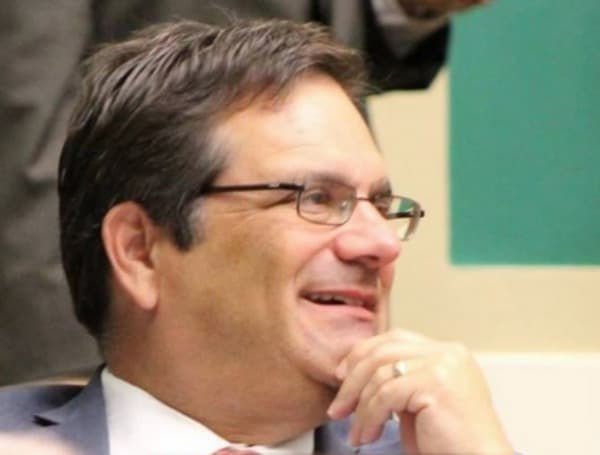In a bipartisan move this week, the House of Representatives passed the TAKE IT DOWN Act, a crucial piece of legislation championed by Congressman Gus Bilirakis. The bill aims to protect individuals from the growing threat of non-consensual intimate imagery (NCII), including realistic AI-generated deepfakes, by criminalizing its publication and mandating swift removal by online platforms.
Congressman Bilirakis (FL-12), Chairman of the Subcommittee on Commerce, Manufacturing, and Trade, played a key role in guiding the bill through the House.
READ: Feds Launch Investigation Into Harvard Over Allegations Of Race-Based Discrimination
Speaking on the House Floor, he underscored the urgency of addressing this issue, particularly in light of emerging technologies.
The impetus for this legislation was further highlighted by a disturbing recent case in Pasco County. The Pasco Sheriff’s Office, while investigating an elementary school teacher on child pornography charges, discovered the individual was using yearbook photos of students to create AI-generated child erotica.
While some charges were possible, law enforcement encountered a loophole, unable to prosecute for the numerous AI-generated images in the teacher’s possession. The TAKE IT DOWN Act directly addresses this gap in the law.
The TAKE IT DOWN Act seeks to protect and empower victims of both real and deepfake NCII while carefully respecting free speech principles. Key provisions of the bill include:
- Criminalizing the publication of NCII in interstate commerce: The bill makes it illegal to knowingly publish NCII, including realistic computer-generated pornographic images and videos depicting identifiable individuals, on social media and other online platforms. Importantly, the bill clarifies that consenting to the creation of an authentic image does not imply consent to its publication.
- Protecting good faith efforts to assist victims: The legislation includes exemptions for the good faith disclosure of NCII in limited circumstances, such as to law enforcement.
- Requiring websites to take down NCII upon notice: Social media platforms and other websites will be required to establish procedures for removing NCII within 48 hours of receiving a valid request from a victim. They must also make reasonable efforts to remove copies of the images. The Federal Trade Commission (FTC) will be responsible for enforcing this provision.
- Protecting lawful speech: The bill is carefully crafted to target the knowing publication of NCII without infringing on legitimate speech. For AI-generated NCII, the bill adopts a “reasonable person” test to ensure it is virtually indistinguishable from an authentic image.
READ: Scott Jennings Tells CNN Host Trump Cleaned Up ‘The Biggest Mess’ On Border, Despite Polls
“I am glad we are one step closer to protecting victims of online sexual exploitation,” stated Congressman Bilirakis. “Giving victims rights to flag non-consensual images and requiring social media companies to remove that content quickly is a pivotal and necessary change to the online landscape. And by ensuring that AI-generated deep-fake content is included in these protections, Congress is showing its commitment to fighting 21st-century harms that are plaguing our children and grandchildren.”
Bilirakis also lauded the bipartisan efforts of Representatives María Elvira Salazar (R-FL), Madeleine Dean (D-PA), Vern Buchanan (R-FL), Debbie Dingell (D-MI), August Pfluger (R-TX), and Stacey Plaskett (D-VI), as well as the entire Subcommittee, for their dedication to the bill’s passage in the House. He urged the Senate to swiftly pass the legislation for President Trump’s signature.
READ: Michelle Obama: Trump’s Deportation Policy ‘Keeps Me Up At Night’
While most states have laws against NCII, including 30 with specific provisions for sexual deepfakes, these laws vary in their classification and penalties, leading to inconsistent prosecution. Furthermore, victims often face significant challenges in getting these images removed from online platforms, causing further distress and repeated victimization.
The TAKE IT DOWN Act builds upon the 2022 legislation that created a civil cause of action for victims, acknowledging that such actions can be time-consuming, costly, and retraumatizing, especially when the perpetrator is unknown.
The TAKE IT DOWN Act has garnered broad support from over 100 organizations, including victim advocacy groups, law enforcement agencies, and tech industry leaders.
Organizations such as RAINN (Rape, Abuse & Incest National Network), the National Fraternal Order of Police, the Cyber Civil Rights Initiative, Microsoft, and the National Center for Missing and Exploited Children (NCMEC) have all voiced their strong endorsement of the bill, highlighting its critical importance in protecting individuals from online sexual exploitation in the digital age.
The bill now moves to the Senate for consideration.
Please make a small donation to the Tampa Free Press to help sustain independent journalism. Your contribution enables us to continue delivering high-quality, local, and national news coverage.
Connect with us: Follow the Tampa Free Press on Facebook and Twitter for breaking news and updates.
Sign up: Subscribe to our free newsletter for a curated selection of top stories delivered straight to your inbox.
